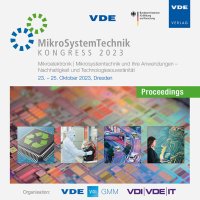Efficiently modelling the fluid-structure interaction of micro-plate-resonators with viscous fluids using modal basis functions
Konferenz: MikroSystemTechnik Kongress 2023 - Kongress
23.10.2023-25.10.2023 in Dresden, Deutschland
Tagungsband: MikroSystemTechnik Kongress 2023
Seiten: 5Sprache: EnglischTyp: PDF
Autoren:
Gesing, Andre; Tran, Thomas; Platz, Daniel; Schmid, Ulrich (Institute of Sensor and Actuator Systems, TU Wien, Austria)
Inhalt:
Cantilevered slender structures form a fundamental basis for micro-resonators, often encountered in fluidic surroundings where the fluid environment dissipates energy from the resonators. While the interaction between viscous fluids and slender resonator geometries is well-understood, addressing fluid losses in non-slender geometries remains a complex challenge. This study proposes a semi-numerical strategy to determine the dynamics of non-slender resonators immersed in viscous fluids. Our approach leverages the Kirchhoff plate equation to describe the plate's dynamics and employs a boundary integral equation method (BIEM) within the Stokes equations to determine the hydrodynamic forces. BIEM circumvents the need for discretizing the entire fluid domain, thereby mitigating multi-scale concerns. The Kirchhoff thin plate theory efficiently determines the resonator's unperturbed vibrational modes from a generalized eigenvalue problem. The unperturbed vibrational modes are employed as basis functions in the Galerkin mode decomposition (GMD) for solving the governing equation. Applying the BIEM and GMD makes the proposed method highly efficient for determin-ing the dynamics of a MEMS resonator in different fluids spanning several vibrational modes and a frequency range extending to units of megahertz.


